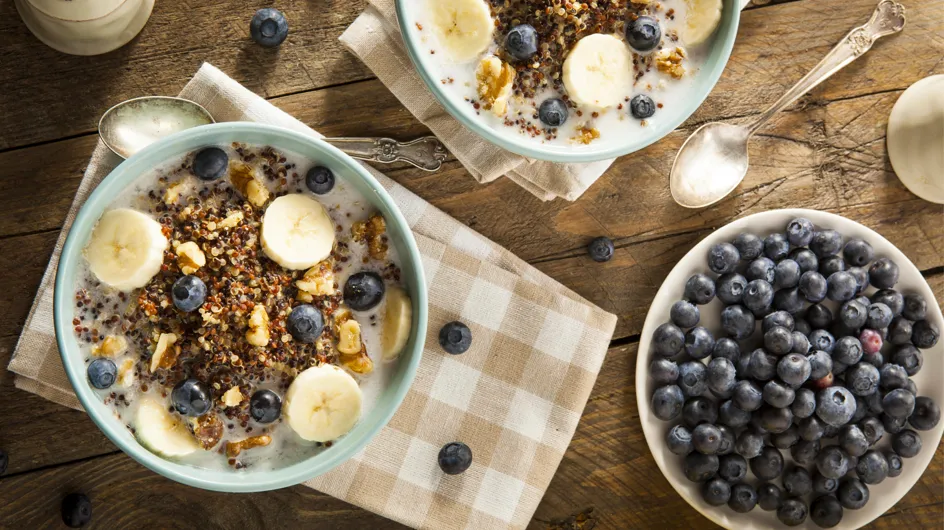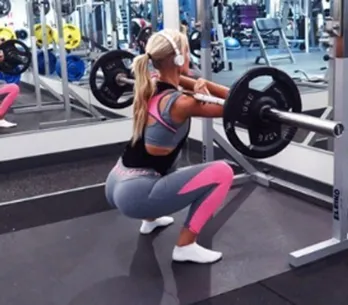According to Adena Neglia, (MS, RDN, CDN) of Brown & Medina Nutrition, carbohydrates are so necessary for our bodies that they're our "body's main source of fuel." So rather than attempting to rid our diets of them completely, we need to balance the types of carbs we're consuming for an overall healthy lifestyle.
"While it's unwise to drastically cut your carbohydrate intake, it's important to look at the quantity and quality of carbohydrates you’re consuming," Neglia says. "Excess consumption of refined carbohydrates, such as white bread, pastries and other highly processed foods, can elevate blood sugar levels, which in turn may increase your risk for heart disease, diabetes and weight gain. The calories from large portions of carbs (whether refined or whole grain) can add up, leading to weight gain."
So with that said, it might be beneficial to consider either adding these good carbs to your diet or at least using some of them to replace the refined carbs you might be eating now. Keep in mind Neglia's words of advice however, as it's still possible to overdo it on those whole grains as well. In fact, it's quite possible to have too much of a good thing when it comes to carb-loading.
Corn
Who doesn't love corn? Whether taken straight from the grill during a summer BBQ, or shaved off the cob in a tasty corn salsa, this starchy vegetable is surely a winner. However, while the pure taste of corn is already a reason for it to be on everyone's radar, nutritionists like Lisa Moskovitz (RD, CDN), the CEO of New York Nutrition Group, agree its health benefits make it a perfect menu item as well.
"The whole grain is usually much higher in nutrients and fibre, which promotes satiety and helps clean out the digestive tract," Lisa Moskovitz (RD, CDN), the CEO of New York Nutrition Group says. "Lutein and zeaxanthin are carotenoids and antioxidants that protect the eye against damaging light and help maintain healthy cells."
Likewise, Neglia says that corn contains two important antioxidants, lutein and zeaxanthin, which can help significantly with our eye health and the "reduction in the risk of chronic eye disease."
"These antioxidants may also play a role in slowing the development of cataracts by protecting the proteins in our lens from oxidative damage," Neglia says.
Fruit
Apples, bananas, plums, cherries, and grapes... there are too many fruits to count! That's good news though. With all that variety and with fruits being much-needed healthy carbs for your body, it's doubtful that you'll ever get bored with what you're eating.
Neglia mentions however, to be mindful of the fact that eating fresh fruit is key. She says that dried fruit and fruit juices should be avoided as they "are a concentrated source of sugar and calories, and can easily add up at the end of the day." So on your next trip to the shop, make sure you're only choosing items for your trolley from the fresh produce and not the juice or snack aisle.
Likewise, it might be helpful to note the differences between each fruit's nutritional value to figure out what's best for your overall lifestyle. For instance, while Moskovitz says that some fruits are higher in fibre, there are also others that are higher in sugar content too.
"For example, bananas only have about 1g of fibre per serving while berries have an average of 5-6 g of fiber per cup," Moskovitz says. "One medium sized mango has almost 50 g of sugar, while blueberries only contain 15 g of sugar for one whole cup. Having said that, there are still plenty of other benefits of mangos and bananas, such as vitamin C, prebiotics and potassium, that make them a worthwhile fruit to eat on occasion. The key is to keep portion sizes in mind and variety no matter which fruit you decide to eat."
Peas
So, many of us might not have been a fan of them when we were young, but now that we're older, we completely understand why our parents always fed us pea puree. And we especially get why peas are still such a fan favourite now. Slightly sweet and delicious all around, peas are a great option as a side for lunch and dinner, and studies have revealed that they might help fight against stomach cancer.
"Peas contain a high amount of a polyphenol called coumestrol," Neglia says. "A study based in Mexico City determined that daily intakes of two milligrams or more of coumestrol may be protective against stomach cancer. More research is needed, but it is always best to get nutrients from a variety of healthy foods."
Whole Grains
From being rich in fibre, to containing B vitamins, and minerals like iron, magnesium and selenium, according to Neglia, whole grains provide an abundance of health benefits. Of these many whole grains, quinoa, bulgur, couscous and brown rice are always ideal options.
Quinoa
"Quinoa is one of the very few plant-based source of a complete proteins, which means it contains all essential amino acids," Moskovitz says. "Quinoa is also rich in fibre, iron, magnesium and phosphorous making it a nutritional all-star."
Bulgur
"Bulgur is also an excellent source of fibre, packing in 8g of this belly-filling nutrient for just 1 cup cooked," Moskovitz says. "No matter what you choose, rice, couscous, bulgur or quinoa, a serving is about 1/2 cup cooked, however more can be eaten if it's used as a primary source of protein or if your calorie needs are higher."
Additionally, Neglia says that we have something to gain from each and every whole grain. So she recommends trying out different kinds and switching it up every now and then to get those wealth of benefits.
Beans
In a salad, soup or taco, beans are both nutritious and help keep us satisfied thanks to their high fibre and protein content, according to Moskovitz.
"While [beans] are not a complete source of protein on their own, they still provide the body with enough filling nutrients that help aid in digestion having been linked to lowering cholesterol and blood sugars," Moskovitz says.
So if you're looking for something to keep you full longer, look no further than that bag of beans sitting in your kitchen cupboard.
Which of these good carbs will you add to your diet? Tweet us @sofeminineUK!
This article was written by Emma Goddard. Follow her on Twitter @egoddardhokie.
Inspirational Tips to Get Your Weight Loss Mission Started:
You Might Also Like:
10 Healthy Ways to Cook with Shirataki Miracle Noodles
How to Cook Kale: 10 Delicious Ways to Serve Curly Kale
The Undervalued Superfood: 11 Amazing Health Benefits Of Mushrooms




















